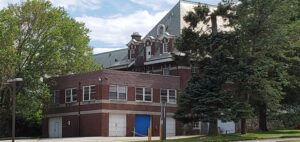
Concerns over the safety of vacant buildings, student supervision, crowds at special events and loss of tax revenue were among the issues raised by Briarcliff Manor residents during a public hearing on a proposed yeshiva on the former Pace campus.
The 90-minute hearing held June 21 before the village Board of Trustees included presentations from Yeshivath Viznitz Dkhal Torath Chaim and questions from more than a dozen residents and officials.
The Monsey-based congregation is seeking a special permit to bring 250 college-age men to the 37-acre Elm Road campus, an enrollment that would grow to 350 over a 10-year period. Pace closed its doors in 2015; the yeshiva bought the property for $11.5 million in 2021.
Yeshiva representatives acknowledged the campus was larger than it needed for its students, most of whom are from Monsey and are now studying in Monticello. It would only need to occupy five of the campus’ nine buildings, purposely choosing those farthest from the road to provide privacy for students and neighbors.
“It’s really a lot bigger than we need, but it’s in a secluded village,” Berel Karniol, a Ramapo-based builder affiliated with the congregation, said about the Briarcliff property.
The yeshiva would be closed during the Shavout and Passover holidays for one month each, during which the campus would be unoccupied. There was no intention of constructing housing for students’ families. Some faculty members would have families stay with them on campus over the weekends.
“The neighbors’ interest and our interests are completely aligned,” Karniol said.
But neighbors voiced concerns over everything from removing the property from the tax rolls, to whether residents could use any of the campus’ facilities, to the relationship between the yeshiva and the entity that purchased the property: Khal Torath Chaim of Rockland, according to town and county records.
How the village would handle noncompliance issues on the campus, whether the dilapidated tennis courts would be torn down, the number of school buses arriving each day, and the brightness of lighting at night, were also raised.
More than one resident referenced the controversy over the Hasidic Jewish congregation’s purchase of the former Nyack College campus, which was a catalyst for the dissolution of the Village of South Nyack.
Daniel Patrick, a lawyer for the yeshiva, said there would be up to 10 special events on campus per year: Three to five would be attended by up to 150 people; the remainder would host about 25 people.
The number of commuter students would require one school bus per day. There would be two to three adult staffers staying overnight to supervise students, Patrick said.
As a religious institution the owner is exempted from town, county, village and school taxes, paying only special district taxes, according to Ossining Town Assessor Fernando Gonzalez. There had been no discussion of a Payment in Lieu of Taxes (PILOT) agreement with the village, Patrick said.
With no tax revenue, no access to campus facilities for neighbors, and students not allowed off campus to shop at local businesses, what benefits would the village reap from the yeshiva, some asked.
Yeshivath representatives said they would consider opening the campus to residents for some purposes.
David Rosenberg, the congregation’s administrator, said Yeshivath Viznitz educated some 5,000 students at various sites, including Brooklyn.
Mayor Steven Vescio and trustees discussed making a visit to the Briarcliff site, as well as considering a trip to Monticello to observe the yeshiva’s operation.
The congregation requires the Board of Trustees’ OK to seek site plan approval before the Planning Board. The public hearing will continue at 7:30 p.m. July 19.
Related coverage:
Briarcliff Planners to Yeshiva: It’s Not 1978 Anymore



